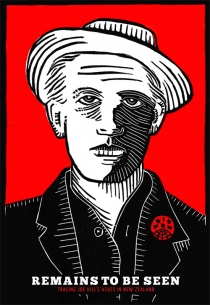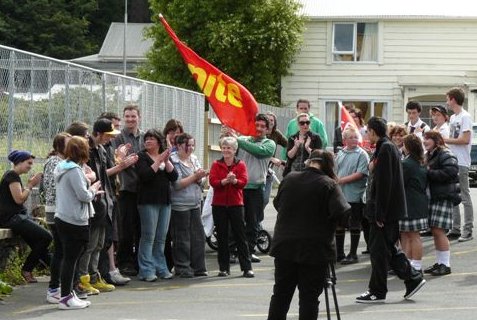 A new pamphlet published by the Workers Party explores our policy of open borders. The pamphlet included frequently asked questions, an essay on the racist history of New Zealand’s immigration controls, a case study of how to fight deportations and an interview with Dennis Maga of the migrant workers organisation Migrante Aotearoa.
A new pamphlet published by the Workers Party explores our policy of open borders. The pamphlet included frequently asked questions, an essay on the racist history of New Zealand’s immigration controls, a case study of how to fight deportations and an interview with Dennis Maga of the migrant workers organisation Migrante Aotearoa.
Open Borders Pamphlet (PDF)
Christchurch event: book launch 'Remains to be Seen'
A new book by Christchurch activist Jared Davidson Remains to be Seen traces the ashes of Joe Hil l — radical songwriter, union organiser and member of the Industrial Workers of the World (IWW) — from their distribution in Chicago to wartime New Zealand. Drawing on previously unseen archival material, it examines the persecution of anarchists, socialists and Wobblies in New Zealand during the First World War. It also explores how intense censorship measures — put in place by the National Coalition Government of William Massey and zealously enforced by New Zealand’s Solicitor-General, Sir John Salmond — effectively silenced and suppressed the IWW in New Zealand.
l — radical songwriter, union organiser and member of the Industrial Workers of the World (IWW) — from their distribution in Chicago to wartime New Zealand. Drawing on previously unseen archival material, it examines the persecution of anarchists, socialists and Wobblies in New Zealand during the First World War. It also explores how intense censorship measures — put in place by the National Coalition Government of William Massey and zealously enforced by New Zealand’s Solicitor-General, Sir John Salmond — effectively silenced and suppressed the IWW in New Zealand.
The book will be launched in Christchurch on Thursday June 30 at Beat Street Cafe (Corner Barbadoes and Armagh), at 5.30pm. Copies of the book will also be available for purchase. A review of Remains to be Seen will appear in the August issue of The Spark and on this website.
Copyright (Infringing File Sharing) Amendment Bill: A Challenge to Democratic Norms
 This article by guest writer Lindsay Breach will appear in the June issue of The Spark
This article by guest writer Lindsay Breach will appear in the June issue of The Spark
The Trans-Pacific Partnership Agreement (TPPA) is a trade agreement between New Zealand, eight other nations, and the United States. Of particular concern to this article, is that the agreement promises to introduce a strongly U.S. influenced intellectual property regime to New Zealand. Already, this influence has been felt in the shaping of copyright legislation as evidenced by leaked cables indicating the industry is willing to pay $533,000 to fix “key gaps in intellectual property rights enforcement”. The lesson: it appears our legislation can be bought.
Wednesday, April the 13th was a black day for democracy in New Zealand. The Copyright (Infringing File Sharing) Amendment Bill was rushed through under urgency, which had been previously reserved for Canterbury earthquake related legislation. This Bill had been postponed due to previous public outcry and was highly contentious law. It seemed particularly insulting to Christchurch residents, the victims of the February 22nd Earthquake, because their suffering and the nation’s state of emergency had seemingly been trivialised.
The Bill introduces a ‘guilt upon accusation’ infringement notice three-strike scheme. This scheme dresses up a civil action, between two parties, as a criminal offense. The copyright holder can request an Internet Service Provider to send an infringement notice, with or without good cause for suspicion, to an account holder. After three strikes, the account holder can be taken to the Copyright tribunal. The burden is on the account holder to prove their innocence against the allegation. Continue reading “Copyright (Infringing File Sharing) Amendment Bill: A Challenge to Democratic Norms”
Lessons of 1951: The waterfront lockout 60 years on (part two)
By Josh Glue, Workers Party Hamilton Branch
(Part 1)
The waterfront lockout of 1951 was one of the most important events in New Zealand labour history. For 151 days, the men who worked the waterfront and those who supported them fought back against the combined power of the ship-owners and the state, who were determined to force cutbacks upon them and destroy their union. Seen as an historical defeat by some, an inspiring fight-back by others, the waterfront lockout holds important lessons for those who struggle for workers rights today.
In this second of two articles about this pivotal moment in the history of the working class of this country, we will examine the way working people came together to oppose the emergency regulations and support the wharfies, the way the government attempted to crush this support, and the way the lockout ended. Most importantly, we will see the importance of these events for modern New Zealand, what we can learn today from the men and women who stood up for their rights in 1951.
Continue reading “Lessons of 1951: The waterfront lockout 60 years on (part two)”
Unite starts Facebook campaign against unfair sacking

Unite has launched a Facebook campaign for Pat Bidois, a union delegate at St Georges Language School who was unfairly dismissed. The page reads:
Management have been trying to get rid of Pat for years as she is an effective and passionate defender of workers rights on her site.
Continue reading “Unite starts Facebook campaign against unfair sacking”
Earthquake results in disaster for Japanese people
Rebecca Broad, Workers Party National Organiser
A magnitude nine earthquake and consequent 23 ft tidal wave, occurring 70km off the northeast coast of Japan March 11, has caused severe and extensive damage to that country. The three prefectures or states of Miyagi, Fukushima, and Iwate have sustained the most damage and loss of life. Multiple coastal towns have been completely destroyed by the tsunami. The Japanese military is heading up the recovery operation with 100,000 troops mobilised. The Ministry of Health, Labor and Welfare estimates that 2.5 million households could be affected, and 1.6 million houses over 11 prefectures have no access to clean water. The number of estimated deaths and officially missing on March 21 was respectively 18,000 and 9,200, according to the National Police Agency. However both of those amounts are expected to continue rising. Nearly 500,000 people are living in emergency shelters and around 22,000 people have been saved by rescuers so far.
Continue reading “Earthquake results in disaster for Japanese people”
Lessons of 1951: The Waterfront Lockout 60 Years On
By Josh Glue, Workers Party Hamilton Branch
The waterfront lockout of 1951 was one of the most important events in New Zealand labour history. For 151 days the men who worked the waterfront and those who supported them fought back against the combined power of the ship-owners and the state, determined to force cutbacks upon them and destroy their union. Seen as an historical defeat by some, an inspiring fight-back by others, the waterfront lockout holds important lessons to those who struggle for workers rights today.
In this first of two articles about this pivotal moment in the history of the working class of this country, we will look at the history of the Waterfront Workers Union and the events that led up to the lockout. In the second article, to be published in the April issue of The Spark Magazine, we will examine the way the lockout ended, the repercussions of that conclusion then, and the relevance of these events for working New Zealanders today.
Continue reading “Lessons of 1951: The Waterfront Lockout 60 Years On”
Victory for Dunedin Pizza Hut workers
Pizza Hut workers in Dunedin have battled for their rights against the bosses and won.
Dunedin’s two Pizza Hut stores were recently sold to new bosses. Upon taking ownership of the stores, the new bosses tried to force all the workers to sign new, individual contracts with inferior terms and conditions and a 90 day fire at will probationary period. This would be laughable if it wasn’t so outrageous – at the North D store the workers have been there for between two and eight years, and without a doubt know the job much better than their new employers!
What the manager clearly didn’t take into account was that these workers are union members. Both sites are Unite Union strongholds – the workers are staunch, aware of their rights, and aware of both the need to fight back and the power they have when they do so. All the workers refused to sign the new contracts, and today they walked off the job in protest.
Social networking sites: Why are they censored?
Marika Pratley (Wellington branch of Workers Party)

Julie Tyler was threatened with serious misconduct by Burger King for posting the comment “Real jobs don’t underpay and overwork like BK does” on a friend’s Facebook page. This event highlighted the limitations of democracy on the internet and social networking sites. It also brings to question limitations on freedom of speech in general – for example – in the workplace.
This is not the first time that workers or activists have faced censorship on social networking sites. In 2010 individual profiles and groups were shutdown by Facebook for expressing support for organisations such as the Popular Front for the Liberation of Palestine (PFLP) and Revolutionary Armed Forces of Colombia (FARC). In 2011 Egypt’s entire internet services were shut down by the government in an attempt to prevent communication between organisers and to stop democratic protests from taking place.
Continue reading “Social networking sites: Why are they censored?”
Migrant workers scammed and starved in New Zealand
Byron Clark (member of Christchurch branch of WP and The Spark editorial committee)
Fijian migrant workers who paid up to $17,000 for visas to work in New Zealand ended up foraging maize from a paddock to feed themselves. Stacey Watson, of Piopio, Waikato, who sourced workers from recruitment company ‘Til Da Cows Come Home’ told Waikato Times journalist Nicola Boyes “We were noticing that the guys didn’t have anything to eat and they didn’t have any supplies and they were foraging for maize to eat.” Til Da Cows Come Home is one of two recruitment companies ran by Mike Neil Molan, who recently pleaded guilty to one charge of forgery and one charge of misleading an immigration officer after a sting at the offices of his company and other related Auckland-based immigration consultants. According to what the company told Stacy Watson, the workers wages were paid into a trust that they could access after they had completed their twelve weeks training and their work visas had been approved. In reality, the visa applications were forged and the dairy industry jobs that workers were promised would be waiting for them at the end of their training never existed. Molan’s ex-wife Nikkie, who was a director of the now defunct second company, Cow Tech, said she got wind of the scam in about November 2008 and confronted Molan. The scam had been going since June or July of that year “It was just a way of getting cash out of people.” she said.
 Manju Pillay was employed as accounts and administration manager at Cow Tech for three months. She paid $6000 of Molan’s $12,736 bill for residency and a work permit before questioning its legitimacy and returning to Fiji. She was never paid for her work. Cow Tech went into liquidation three months after she started working for it and she contacted the Immigration Department. Molan worked with Auckland based IMAC Recruitment and Romy’s Immigration, which have since been struck off the company’s register. This is not the first case of its kind, last year four Hawkes Bay men were sentenced to three years in jail for running a multi-million dollar operation that employed hundreds of undocumented workers to pick fruit and vegetables at well below the minimum wage. Between 2007 and 2010 eighteen people in Hawkes Bay, Nelson and Marlborough were prosecuted as a result of Immigration New Zealand investigations. In 2007 it was estimated that there were 20,000 undocumented workers in New Zealand.
Manju Pillay was employed as accounts and administration manager at Cow Tech for three months. She paid $6000 of Molan’s $12,736 bill for residency and a work permit before questioning its legitimacy and returning to Fiji. She was never paid for her work. Cow Tech went into liquidation three months after she started working for it and she contacted the Immigration Department. Molan worked with Auckland based IMAC Recruitment and Romy’s Immigration, which have since been struck off the company’s register. This is not the first case of its kind, last year four Hawkes Bay men were sentenced to three years in jail for running a multi-million dollar operation that employed hundreds of undocumented workers to pick fruit and vegetables at well below the minimum wage. Between 2007 and 2010 eighteen people in Hawkes Bay, Nelson and Marlborough were prosecuted as a result of Immigration New Zealand investigations. In 2007 it was estimated that there were 20,000 undocumented workers in New Zealand.
There has also been concern about migrant workers who have worked legally under the Recognised Seasonal Employer scheme. Such workers have been left with little money in the hand after deductions are made from their wages and large sums are paid to unscrupulous accommodation providers- last year a 4-bedroomed house calling itself a “backpackers” housed eighteen Ni-Vanuatu workers and charged them $115 each per week. Lina Ericsson a Swedish political scientist who conducted field work among RSE workers in the rural areas near Tauranga in 2007 found many stories of mistreatment and violation of employment rights. The majority of farm workers (60%) are employed without contracts, almost a year ago the Council of Trade Unions highlighted the need for a farm workers union. At the moment such a project seems elusive when over 85 percent of private sector workers aren’t unionised.
Not only are the conditions of migrant farm workers morally
outrageous. It’s beneficial for all workers in New Zealand to support the cause of such workers because the employment standards set by these most immoral employers impact on the conditions of the whole working class.


